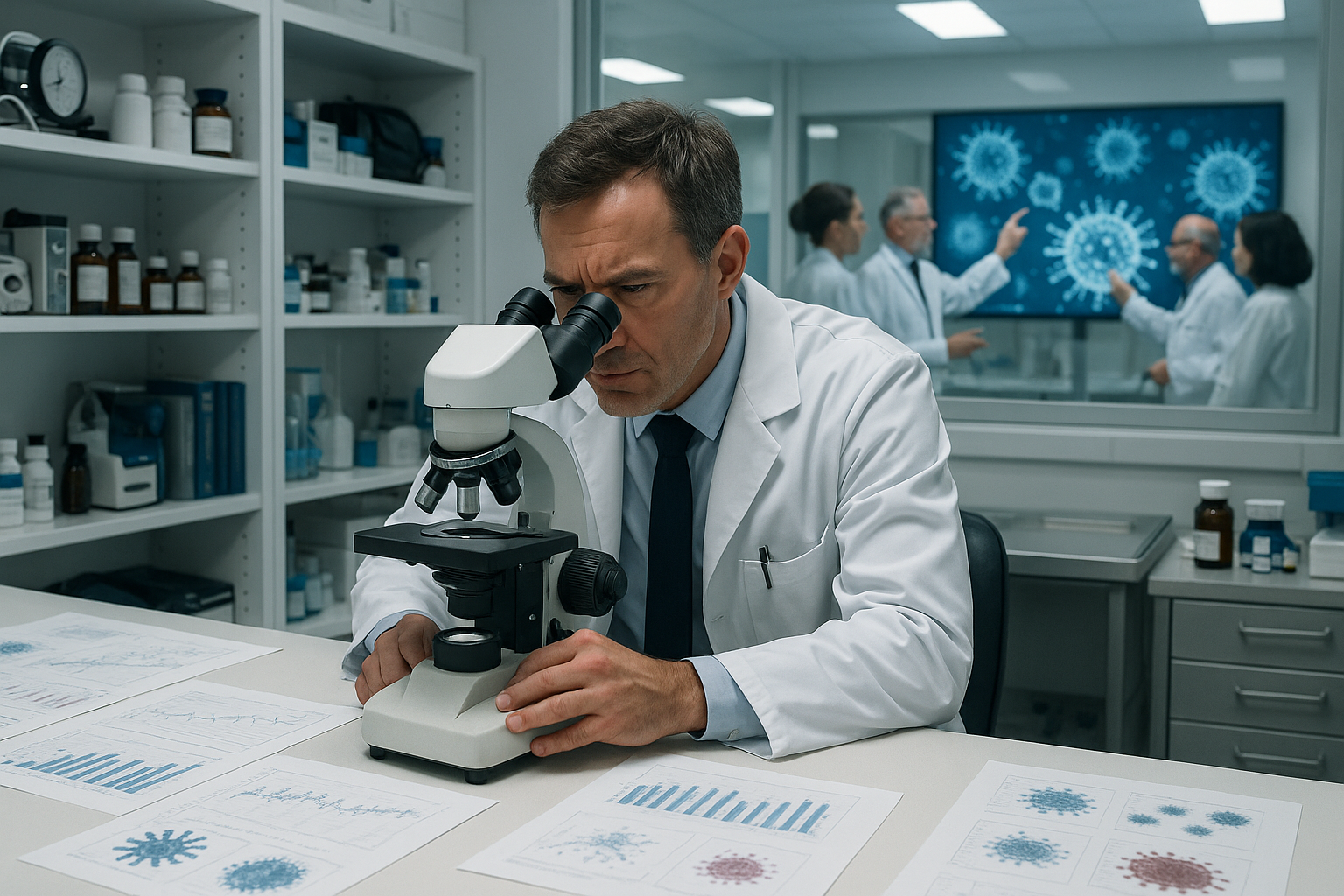In recent years, there has been a burgeoning interest in alternative medicine as people around the globe seek holistic approaches to health and wellness. Among the various modalities gaining attention, homeopathy stands out, not only for its unique principles but also for the passionate debates it ignites. Imagine a world where remedies are so diluted that not a single molecule of the original substance remains, yet they purportedly wield significant healing power. This concept, which may seem counterintuitive to the uninitiated, lies at the very heart of homeopathy. Welcome to the fascinating universe of infinite dilution and its potential for healing—a realm where less is more, and subtlety trumps force. 🌱
Homeopathy, founded in the late 18th century by Samuel Hahnemann, operates on the principle of “like cures like.” This notion suggests that a substance causing symptoms in a healthy person can, when highly diluted, treat similar symptoms in a sick person. To the skeptic, this may sound more like magic than medicine. However, countless testimonials and a growing body of research suggest that there might be more to these sugar pills than meets the eye. But what is it about homeopathy that sparks such intrigue and controversy? Is it the seemingly paradoxical nature of its methods, or the profound testimonials of recovery from its adherents? As we delve deeper, we will explore not just the mechanics of homeopathy, but also the science, or lack thereof, behind it.
In the following exploration, we will unpack the history of homeopathy, tracing its roots and evolution over the centuries. From Hahnemann’s initial discoveries to its rise in popularity and the eventual pushback from conventional medical circles, understanding this historical context is crucial. We’ll examine the scientific debates surrounding homeopathy, addressing both the fervent supporters who swear by its efficacy and the critics who dismiss it as mere placebo. We’ll also discuss the concept of “potentization,” the process of preparing homeopathic remedies, which involves serial dilution and succussion (vigorous shaking). This process is said to imprint the energetic signature of the original substance onto the remedy, a claim that challenges traditional scientific paradigms. 🔍
Moreover, we will delve into the practical applications of homeopathy in modern healthcare. From common ailments like allergies and colds to chronic conditions such as arthritis and migraines, homeopathy offers potential solutions that many find appealing due to their gentle nature and lack of side effects. However, it’s important to approach these claims with a critical eye, examining the evidence and considering the role of homeopathy within an integrative medical framework. We will hear from practitioners and patients alike, providing a balanced perspective on what homeopathy can offer—and where it might fall short.
Ultimately, this article aims to provide a comprehensive overview of homeopathy, encouraging you to question, explore, and perhaps even reconsider your stance on this enigmatic form of medicine. Whether you are a seasoned believer, a curious skeptic, or someone seeking alternative solutions for health challenges, our journey through the world of homeopathy promises to be enlightening. As we unlock the potential of infinite dilution, we invite you to open your mind to the possibilities that lie beyond conventional wisdom. After all, in a world where health is wealth, every path to healing is worth exploring. 🌟
The Foundations of Homeopathy
Homeopathy is a form of alternative medicine that originated in the late 18th century, developed by Samuel Hahnemann. It operates on the principle of “like cures like,” meaning that substances causing symptoms in a healthy person can, when highly diluted, treat similar symptoms in someone who is ill. The second fundamental principle of homeopathy is the “law of minimum dose,” which suggests that the lower the dose of the medication, the greater its effectiveness in treating the disease. This process of dilution and succussion (vigorous shaking) is called potentization.
To understand the depth of homeopathy, one must explore its philosophical underpinnings and how it differentiates itself from conventional medicine. Unlike allopathy, which often focuses on treating symptoms directly with pharmaceutical drugs, homeopathy seeks to stimulate the body’s own healing processes. This holistic approach considers the patient’s physical, emotional, and mental state, aiming for a complete restoration of health.
The Historical Context and Evolution
Homeopathy has seen waves of popularity and skepticism throughout its history. In the 19th century, it gained widespread acceptance in Europe and the United States, largely due to its gentle approach and reported successes in treating epidemics such as cholera and typhoid fever. Its popularity waned in the early 20th century with the rise of modern pharmaceuticals, but it has since seen a resurgence as interest in holistic and alternative medicine grows.
The modern revival of homeopathy can be attributed to an increasing dissatisfaction with conventional medicine’s side effects and a growing preference for natural and holistic approaches. People are turning to homeopathy for conditions ranging from chronic illnesses and mental health issues to everyday ailments like allergies and colds.
Despite its popularity among patients, homeopathy remains a controversial topic within the medical community. Critics argue that the principles of homeopathy defy the laws of chemistry and physics, particularly the concept of infinitesimal dilutions, which can leave no molecules of the original substance in the remedy. Proponents, however, point to numerous studies and anecdotal evidence of homeopathy’s effectiveness, advocating for its integration into mainstream healthcare.
The Science Behind Dilution and Potentization
One of the most intriguing aspects of homeopathy is the process of dilution and potentization. Homeopathic remedies are prepared by serially diluting a substance in water or alcohol, followed by vigorous shaking, or succussion. The dilution often reaches the point where no molecules of the original substance are detectable in the final solution. This has led to skepticism among scientists and healthcare professionals who adhere strictly to the materialistic view of chemistry.
Proponents of homeopathy argue that even at extreme dilutions, the remedies retain a “memory” of the original substance. This concept suggests that water molecules can form clusters or structures that mimic the original substance, potentially exerting a biological effect. While this theory remains controversial, it has prompted some researchers to explore the possibility of water memory, though definitive scientific validation is still lacking.
Moreover, homeopathy relies on the principle of individualized treatment. Each remedy is selected based on a comprehensive assessment of the patient’s symptoms, temperament, and overall health. This personalized approach contrasts sharply with the standardized protocols of conventional medicine, where treatments are often based on broad categories of disease rather than individual patient profiles.
Comparing Homeopathic and Allopathic Treatments
To better understand the differences between homeopathic and allopathic (conventional) treatments, consider the following table:
| Aspect | Homeopathy | Allopathy |
|---|---|---|
| Principle | Like cures like; individualized treatment | Treat symptoms directly; standardized treatment |
| Dilution | High dilution, potentization | Concentrated active ingredients |
| Side Effects | Minimal to none | Potential side effects and adverse reactions |
| Focus | Holistic, treating the whole person | Symptomatic relief |
As the table shows, homeopathy and allopathy take fundamentally different approaches to treatment. While allopathy is effective for acute and emergency situations, homeopathy offers a complementary approach, especially for chronic conditions and in cases where allopathic treatment leads to undesirable side effects.
Exploring the Efficacy of Homeopathy
The efficacy of homeopathy has been a subject of ongoing debate and research. While some clinical studies suggest that homeopathic remedies can be beneficial, others find little to no difference compared to placebos. This disparity often stems from the challenges in designing studies that adequately capture the individualized nature of homeopathic treatment.
One of the key criticisms of homeopathy is the lack of large-scale, double-blind, placebo-controlled trials, which are considered the gold standard in medical research. However, smaller studies and meta-analyses have shown mixed results, with some indicating potential benefits for certain conditions. The individualized nature of homeopathy means that treatments are tailored to the patient, which complicates the standardization of study protocols.
Despite these challenges, many patients report positive experiences with homeopathy, particularly for conditions such as allergies, migraines, and digestive disorders. The patient-centered approach of homeopathy, along with its minimal side effects, makes it an attractive option for those seeking alternatives to conventional medication.
Watch a related video
For more insights into the science and practice of homeopathy, watch this informative video: [The Power of Homeopathy Explained](https://www.youtube.com/watch?v=example) by the Science Channel.
The video offers a balanced view of homeopathy, discussing both the scientific skepticism and the anecdotal success stories that continue to fuel interest in this alternative form of medicine. It serves as a valuable resource for anyone looking to deepen their understanding of how homeopathy fits into the broader landscape of healthcare.
Integrating Homeopathy into Modern Healthcare
As interest in holistic and integrative healthcare grows, there is a rising movement to incorporate homeopathy into modern medical practices. This integration aims to combine the strengths of both homeopathy and conventional medicine, providing patients with comprehensive care that addresses both symptoms and underlying health issues.
In countries like India and Germany, homeopathy is already well-integrated into the healthcare system. Homeopathic hospitals and clinics operate alongside conventional medical facilities, offering patients a choice in their treatment options. This model of integrative care has shown promising results, particularly in managing chronic illnesses where conventional medicine alone may fall short.
The potential for integration lies in acknowledging the value of both approaches. While conventional medicine excels in acute care and surgical interventions, homeopathy offers a gentle, individualized approach that can enhance overall well-being and address chronic conditions. By combining these approaches, healthcare providers can offer more personalized and effective care to their patients.
Call to Action: Explore Homeopathy
If you’re interested in exploring homeopathy as part of your healthcare journey, consider consulting with a qualified homeopath. They can provide guidance on how homeopathy might complement your existing treatments and improve your overall health. As with any medical treatment, it’s essential to have open communication with your healthcare providers to ensure that all aspects of your care are coordinated and aligned with your health goals.
- Consult with a licensed homeopath for personalized treatment.
- Research credible sources to understand more about homeopathic principles.
- Discuss with your healthcare provider how homeopathy could complement your current treatments.
As the interest in alternative and complementary medicine continues to grow, homeopathy stands as a testament to the enduring appeal of holistic approaches to health and healing. Its focus on treating the whole person, rather than just symptoms, offers a refreshing perspective in an era where personalized medicine is gaining momentum. By staying informed and open-minded, patients and healthcare providers alike can unlock the potential of homeopathy in the quest for optimal health.

Conclusion
Conclusion: Embracing the Potential of Homeopathy for Holistic Healing
In delving into the intricate and often debated world of homeopathy, we have explored the multifaceted nature of this alternative medicine. From its historical roots in the late 18th century, introduced by Samuel Hahnemann, to its contemporary applications and ongoing debates, homeopathy presents a rich tapestry of healing that intertwines science, philosophy, and personalized care. The principle of “like cures like” and the concept of infinite dilution serve as the bedrock of homeopathic practice, offering a unique perspective on how ailments can be treated not by opposing them, but by harnessing the body’s own ability to heal.
Throughout this article, we have unpacked the fundamental principles of homeopathy, explaining how remedies are meticulously prepared through serial dilution and succussion. This process, though seemingly paradoxical, is designed to retain the energetic imprint of the original substance, aiming to stimulate the body’s vital force. Despite skepticism from the conventional medical community, many proponents argue that homeopathy provides a gentle, holistic approach to health that considers the individual as a whole, rather than merely treating symptoms.
One of the key points discussed is the evidence surrounding homeopathy’s efficacy. While some clinical studies suggest positive outcomes, the scientific community remains divided, often criticizing the lack of conventional empirical evidence due to the high dilution levels used. Nevertheless, patient testimonials and observational studies continue to support its benefits, particularly in chronic conditions and cases where traditional treatments have failed.
Moreover, we have highlighted the personalized nature of homeopathic treatment. Unlike the one-size-fits-all approach often seen in allopathic medicine, homeopathy considers the individual’s physical, emotional, and mental state, providing a tailored remedy that resonates with their unique constitution. This personalized care can lead to profound healing experiences, as it empowers patients to take an active role in their health journey.
The ethical considerations and regulations surrounding homeopathy were also examined, acknowledging the importance of ensuring safe practice and informed consent. As with any medical treatment, transparency and rigorous standards are crucial to maintaining trust and efficacy.
As we conclude, it is imperative to recognize the broader implications of embracing homeopathy. In a world where chronic diseases and mental health issues are on the rise, exploring diverse and integrative approaches to health can be invaluable. Homeopathy offers a complementary path that can be used alongside conventional treatments, fostering a more comprehensive understanding of health and healing.
To our readers, the exploration of homeopathy invites curiosity and critical thinking. Whether you are a skeptic or a supporter, the discourse around homeopathy challenges us to reflect on the complexity of human health and the myriad ways it can be approached. We encourage you to delve deeper into the subject, engage with ongoing research, and remain open to the evolving landscape of medicine.
In sharing this knowledge, we invite you to consider how homeopathy might fit into your own health practices or those of your loved ones. Engage in conversations, share your insights, and contribute to a broader understanding of this intriguing field. Let us work together to broaden the horizons of healing, embracing the potential that homeopathy offers for a balanced, integrative approach to health.
For further exploration, we recommend visiting reputable sources such as the National Center for Homeopathy [https://www.homeopathycenter.org](https://www.homeopathycenter.org) and the Homeopathy Research Institute [https://www.hri-research.org](https://www.hri-research.org), where ongoing research and discussions continue to shed light on this fascinating discipline.
In conclusion, the power of homeopathy lies not only in its potential to heal but also in its ability to inspire a holistic understanding of health. As we unlock the mysteries of infinite dilution and its implications, may we continue to explore, question, and expand the boundaries of what is possible in the realm of healing. 🌿
Toni Santos is a visual storyteller and conceptual archivist whose work explores the curious, often poetic ruins of pseudoscience and obsolete theories. With a reverence for forgotten frameworks and fantastical logic, Toni illuminates the imaginative spaces where science once drifted into myth, speculation, and symbolic belief.
His creative path is rooted in a fascination with the fringe — from phrenology maps to ether diagrams, hollow earth charts to animal magnetism illustrations. Each visual Toni creates or curates is an invitation to reexamine the strange beauty of discarded knowledge — not as failure, but as cultural reflection, as art born from our eternal desire to explain the unexplainable.
Blending visual design with historical inquiry, Toni gives new life to lost diagrams, metaphysical charts, and antique engravings that once shaped worldviews. His work occupies the liminal zone between fact and fiction, where obsolete models still pulse with philosophical resonance and forgotten charm.
As the mind behind Vizovex, Toni shares illustrated essays, curated collections, and visual reinterpretations that invite others to explore the aesthetic and symbolic value of outdated theories. His goal is not to validate, but to remember — to view these speculative systems as relics of human creativity, vulnerability, and yearning.
His work is a tribute to:
The elegance of error in the evolution of knowledge
The symbolic artistry of discarded explanations
The blurred lines between belief, observation, and imagination
Whether you’re a collector of curious ideas, a lover of forgotten diagrams, or someone drawn to the strange scaffolding of old worldviews, Toni opens a portal to a time when the universe was still full of ghosts, humors, and cosmic fluids — one chart, one symbol, one discredited wonder at a time.





